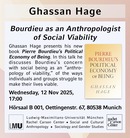Ghassan Hage on “Bourdieu as an Anthropologist of Social Viability”
Guest Lecture
12.11.2025 17:00 – 19:00
Location: Room B 001, Oettingenstr. 67, 80538 Munich
Conveners: The Rachel Carson Center for Environment and Society, the Institute of Social and Cultural Anthropology, and the Chair of Sociology and Gender Studies, LMU Munich
Respondent: Jan David Hauck (RCC)
Ghassan Hage presents his new book Pierre Bourdieu’s Political Economy of Being (Duke University Press, 2025).
Over the years, Ghassan Hage has tried to develop what he has called an anthropology of viability: an anthropology concerned with the way individuals and groups struggle to make their lives viable. Without wishing to reduce Bourdieu to an anthropologist of viability, his book can be read as an attempt to highlight what he sees as Bourdieu’s contribution to an anthropology of viability. In this talk Ghassan Hage will try to show how a struggle for viability is an enduring dimension of Bourdieu’s analytical disposition toward society. Analysts who inherit and internalize this disposition start seeing struggles for viability in everything. Whether they are analyzing someone picking flowers in the countryside, talking about the latest Netflix series they have seen, looking for a job, or demonstrating for or against asylum seekers, they find themselves asking, What conception of a viable life is behind what is being done here?
Ghassan Hage will hold a second lecture on Friday, 14 November, at 18:00. See here for more information.
Ghassan Hage is a professor of anthropology working between Australia, Lebanon, and Europe. He is currently the Visiting Simon Professor at the University of Manchester. His work covers many areas of inquiry, which include an engagement with multiculturalism, racism, and White supremacy in Australia, the relation between White colonial domination and the human domination of the environment, ethnographic explorations among the Lebanese diaspora in the world, and critical anthropological theory.


